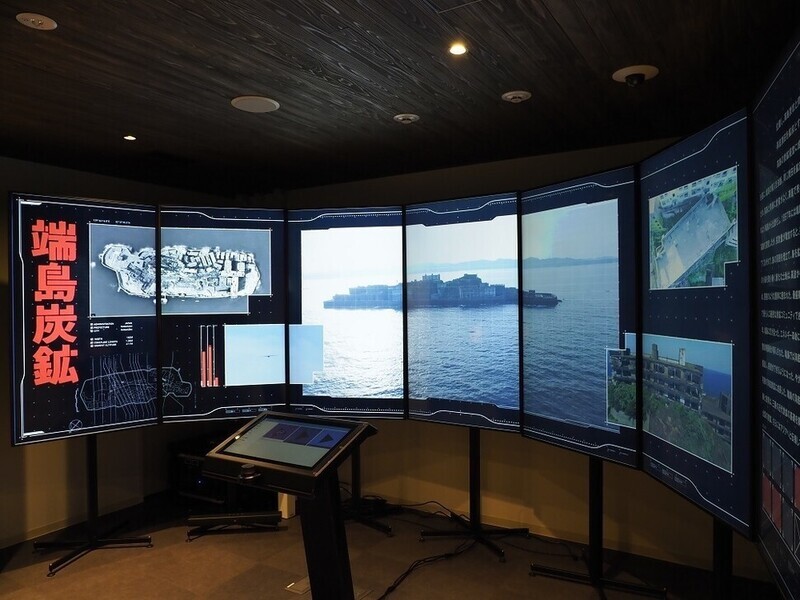hankyoreh
Links to other country sites 다른 나라 사이트 링크
64 S. Korean, Japanese civic groups denounce historical distortion of Tokyo’s Industrial Heritage Information Center

Sixty-four South Korean and Japanese civic groups issued a joint statement calling on the recently opened Industrial Heritage Information Center in Tokyo to “stop distorting history” with its displays. Forty-nine Japanese groups involved in peace, religious activities, and historical issues took part.
In a statement issued on the afternoon of July 14, the groups insisted that the Japanese government should “honor the promise it made when it registered the Meiji Industrial Revolution-related facilities as UNESCO World Heritage Sites in 2015.” At the time of their registration, Japan pledged to adopt measures to commemorate Korean victims of forced labor. But the exhibits on Japan’s Meiji Industrial Revolution sites -- including Hashima Island (also known as Gunkanjima, or “Battleship Island”) -- that were opened to the public on June 15 included no such content. Indeed, most of the displays presented a skewed version of history, with claims that laborers “lived in good conditions” and were “free.”
“Japan continues denying its history of forced labor,” the groups said, characterizing the actions as “flying in the face of the UNESCO spirit of achieving peace through the pursuit of intellectual and spiritual solidarity among the world’s citizens.”
“We protest the exhibitions at the industrial heritage information center,” they continued, insisting that it “should belatedly incorporate displays relating the conditions and testimony of victims of forced labor.”
On June 22, the South Korean government submitted a request to UNESCO asking it to examine revoking the World Heritage registration of Japan’s industrialization sites due to the industrial heritage information center’s inclusion of displays distorting the history of Gunkanjima.
By Kim So-youn, staff reporter
Please direct comments or questions to [english@hani.co.kr]

Editorial・opinion
![[Column] Park Geun-hye déjà vu in Yoon Suk-yeol [Column] Park Geun-hye déjà vu in Yoon Suk-yeol](https://flexible.img.hani.co.kr/flexible/normal/500/300/imgdb/original/2024/0424/651713945113788.jpg) [Column] Park Geun-hye déjà vu in Yoon Suk-yeol
[Column] Park Geun-hye déjà vu in Yoon Suk-yeol![[Editorial] New weight of N. Korea’s nuclear threats makes dialogue all the more urgent [Editorial] New weight of N. Korea’s nuclear threats makes dialogue all the more urgent](https://flexible.img.hani.co.kr/flexible/normal/500/300/imgdb/original/2024/0424/7317139454662664.jpg) [Editorial] New weight of N. Korea’s nuclear threats makes dialogue all the more urgent
[Editorial] New weight of N. Korea’s nuclear threats makes dialogue all the more urgent- [Guest essay] The real reason Korea’s new right wants to dub Rhee a founding father
- [Column] ‘Choson’: Is it time we start referring to N. Korea in its own terms?
- [Editorial] Japan’s rewriting of history with Korea has gone too far
- [Column] The president’s questionable capacity for dialogue
- [Column] Are chaebol firms just pizza pies for families to divvy up as they please?
- [Column] Has Korea, too, crossed the Rubicon on China?
- [Correspondent’s column] In Japan’s alliance with US, echoes of its past alliances with UK
- [Editorial] Does Yoon think the Korean public is wrong?
Most viewed articles
- 1[Column] Park Geun-hye déjà vu in Yoon Suk-yeol
- 2Will NewJeans end up collateral damage in internal feud at K-pop juggernaut Hybe?
- 3Thursday to mark start of resignations by senior doctors amid standoff with government
- 4Why Korea shouldn’t welcome Japan’s newly beefed up defense cooperation with US
- 5‘We must say no’: Seoul defense chief on Korean, USFK involvement in hypothetical Taiwan crisis
- 6[Guest essay] The real reason Korea’s new right wants to dub Rhee a founding father
- 7N. Korean hackers breached 10 defense contractors in South for months, police say
- 8[Column] ‘Choson’: Is it time we start referring to N. Korea in its own terms?
- 9[Editorial] New weight of N. Korea’s nuclear threats makes dialogue all the more urgent
- 10Kim Jong-un expressed ‘satisfaction’ with nuclear counterstrike drill directed at South